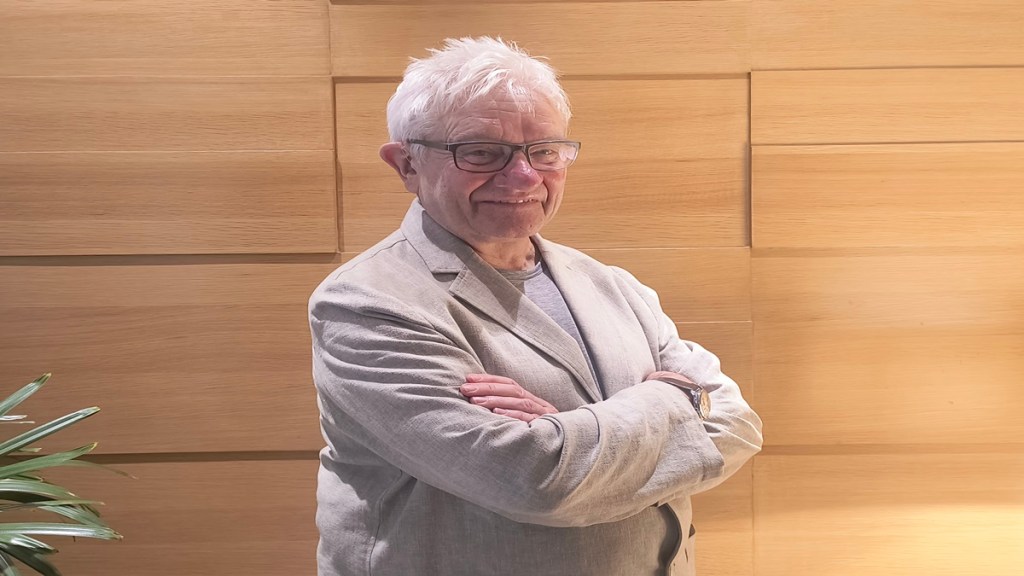India had a special visitor during the weekend – Sir Paul Nurse, who was awarded the 2001 Nobel Prize in Physiology or Medicine, for his discoveries around the cdc2 gene and protein molecules that control cell division. His research has been foundational in understanding and treating cancer. He is the former president of Rockefeller University, former president of the Royal Society, current director of the Francis Crick Institute in London, and in November he will become the first person to lead the Royal Society for the second time.
He was the chief guest at Ashoka University’s 11th convocation ceremony on May 24, and wants the brightest Indian biomedical minds to work towards advancing scientific research. In an interview with FE’s Vikram Chaudhary, Sir Nurse talked about cell cycle and cancer, how research is shaping early detection and treatment, the future of biomedical science in the age of artificial intelligence (AI), and how to strengthen research ecosystems in Indian universities. Excerpts:
You’re a scientist and a researcher, but also a teacher. Should students be taking part in non-academic activities on the campus, of the like we have seen in some American universities? Should a researcher be protesting about geopolitical issues?
Universities are a place for debate, but we have seen a lot of cancel culture of late. Cancel culture is this practice of withdrawing support for individuals or organisations in response to their perceived actions or statements. I am a liberal, and I think we should argue about anything and everything. At the end of the day, there is real value in diversity of ideas – and healthy discussions end up making the world a better place.
What kind of students go into research? Is there enough money in this field?
Students who get into the field of research are driven by something else, not just money. It’s a privilege to do research. I have a job where I pursued my curiosity for 50 years, and they are still paying me money. Life isn’t just about a bigger car or a bigger house – most of my colleagues are modest, but comfortable in their jobs. What motivates researchers is discovering something new – you are paid for being curious. What’s better than that?
What is the standard of research that you have seen at Indian universities?
I have been visiting India since the 1980s, and in the last 10-15 years, I have seen a significant change in the focus on research at Indian universities. Ashoka University is a clear example of the kind of investment happening in research facilities. Indian universities were possibly underfunded in research, but the role science can play in both societal and economic development is being increasingly recognised. One of the reasons I am in India is to see how the Francis Crick Institute in London (which I run) can work with Indian research institutions and universities.
The Francis Crick Institute is hiring more than 100 researchers every year, and I am looking for some bright minds from India to join us.
How has your Nobel-winning work (on cell cycle) changed over the years?
That work is still going on – human body is far too complex to be understood in a lifetime. But this work has helped us understand cell division and diseases such as cancer in a better way – and only when you understand cancer, you can find a better cure.
When I started my work on cells, the objective wasn’t about understanding or finding a cure for cancer, but as we proceeded, we saw the links. If you remember, long ago, in 1971, the US President Richard Nixon declared a ‘war on cancer’ by signing the National Cancer Act into law, significantly increasing the funding for cancer research and treatment. But it went nowhere, because we didn’t understand cancer. Today, we are in a much better position to control cancer, because we understand it better – and a lot of that understanding has happened thanks to the work of hundreds of scientists working in the area of cells.
Where do you see India in biomedical research?
It is on an upward curve. India, traditionally, has been strong in physics and mathematics – and I don’t know why – but now there is an equal focus on life sciences. I believe India can achieve a lot more in biomedical research – because of its strong strength in physics and mathematics, because all sciences are connected.
Is AI speeding up research?
Yes, everything has gotten a lot faster in the last decade – today, a robot can do simple or risky things on behalf of a scientist, and we also have faster computational methods – but we have lost something in the process. We don’t have enough time to think any more – things are moving so fast that we often tend to take the obvious (something that the computer tells us) for granted, without giving much it thought.
We need to make more space for ideas in our minds, and we are losing that space because of the complexity of experiments, thinking that AI will do it on behalf of us, and thinking that what the computer does is God-like.
Will you be teaching in India?
I am trying to establish a link. I am stepping down from the Francis Crick Institute in September, and I will take another job – as the president of the Royal Society (it’s a fellowship of the world’s most eminent scientists, and is the oldest scientific academy in continuous existence). I will be the first person to become the president of the Royal Society for the second time (my earlier stint was from 2010-15). I will then get more time for teaching, maybe.

